Soundproofer Southsea Hampshire (PO4): If your home in Southsea is being adversely affected by noise, maybe you should consider installing or upgrading your soundproofing to bring tranquillity to your bedroom, lounge, home office or studio. Conversely you may want to soundproof a single room to keep load noises in, such as in a family room or home cinema, to avoid disturbing others. Whatever your needs are, soundproofing will provide you with peace of mind.
Before we can discover ways in which to combat sound pollution, it will help if we understand how sound travels.
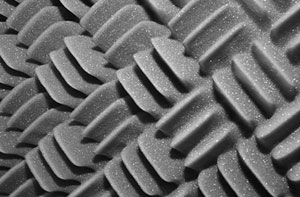
Basically, sound moves in two ways around a home:
1. The vibration or air molecules through the air.
2. Through objects by the vibration of the material.
Sound is also transmitted through water, but unless you're looking at soundproofing an aquarium or swimming pool we'll just consider the isolation via materials and air.
SOUND TRAVELLING THROUGH THE AIR
Sound can be transferred out of and into a room through gaps around doors, single glazed windows, heating ducts and even electrical sockets and light fittings. What we hear as sound is essentially the vibration of air molecules being picked up by our ear drums. No matter the source of the sound; heavy machinery, traffic, music playing, children playing or aircraft, all sounds are generated and transmitted in precisely the same manner.
Any gaps within a room can be regarded as a leak and will need to be plugged.
SOUND TRAVEL THROUGH OBJECTS AND STRUCTURES
If sound travels through the air by vibration, then it seems logical that this vibration can be absorbed by, reflected by or transferred to different materials. Sound will vibrate the floors, walls and ceilings of your rooms, and may lead to a resonating effect that is transmitted outside the room itself. Even in a room that is encased in a solid material that is resistant to vibrations, such as a concrete lined cellar, the sound can be reflected and possibly even amplified to other areas of the structure.
So, how can we stop this resonation from affecting other people? Soundproofing of course.
BASIC STEPS IN SOUNDPROOFING
Give some thought to covering bare floors, which resonate and reflect sound, with a carpet or rug. These soft coverings and rugs will help to soak up noises but can also add a touch of style to a previously bare room. Hanging wall coverings and curtains can also suppress sound vibrations and reflections through walls and windows without the need for a professional team of soundproofing specislists.
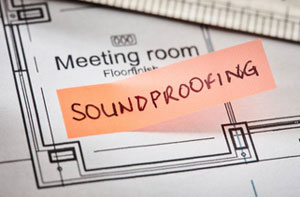
Another cost-effective and DIY solution is to plug any holes or gaps around light fittings, door frames, windows and sockets. Plugging the gaps and holes with a specialist acoustic sealant that can be purchased in many DIY and building material shops, can make a massive difference to sound transmission in your rooms. Acoustic sealants are inclined to be a touch more pricey than regular sealant products, however the special design has far greater soundproofing performance and is certainly worth the small extra cost.
If your room is an empty canvas and you are soundproofing while you decorate or renovate, think about putting up a skin of soundboard or plasterboard, (also called sheet rock, gyproc or drywall). This is an efficient and economical soundproofing material due to its dense nature. It is excellent for areas such as home cinemas, music studios or home offices that are being built within a property. If you do decide to use plasterboard to aid your soundproofing exploits it is better to use a specialist fitter in Southsea, to achieve the maximum possible effect from its installment.
Last but not least you should examine all doors in the room you're planning to soundproof. Whilst hollow doors are lightweight and comparatively affordable, their soundproofing attributes aren't the best. Switching hollow core doors for solid core will significantly enhance the soundproofing of a room with only a minimal extra cost.
PROFESSIONAL SOUNDPROOFING SOLUTIONS SOUTHSEA
Some properties, such as those on aircraft flight-paths or next to busy routes, naturally have more sound problems and will need other ways to deal with the dilemma. You'll obtain the most effective soundproofing outcome by using the services of an established soundproofing company.
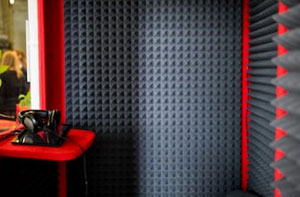
They should ask the four following questions during the initial appraisal of your needs:
- Where is the majority of the noise emanating from? The ceiling, windows, floor, doors or walls.
- How large is the area that needs soundproofing?
- What are the specific sounds that you need to be soundproofed? i.e. Is it outside noises such as trains, traffic noise, noisy neighbours etc, or is it from within your home such as a teenagers bedroom or family room.
- What sort of room or property would you like to soundproof? Is it a brick wall, a lined concrete wall or a plasterboarded partition wall etc.
Your answers to such queries will allow you to receive quotations for the various available solutions that match your requirements. They'll offer different methods for soundproofing each of the main trouble spots within your room.
PROFESSIONAL SOUNDPROOFING OF FLOORS, CEILINGS and WALLS
2 key approaches are needed to soundproof any size of space:
- Reduce sound amplifying and resonating.
- Update and enhance the amount of sound absorption.
A site survey will be necessary to pinpoint the areas that need improving.
A professional soundproofer will investigate the different methods for adding mass and density to the troublesome areas. This additional mass will help to improve absorption of the sound energy through the use of acoustic foam or rubber to gain the maximum impact of sound reduction.
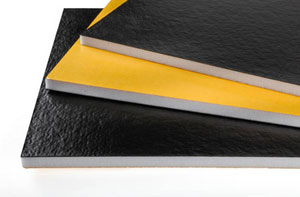
Insulation between any existing voids will be improved to lessen the noise amplification and resonation of these "sound boxes". If you think about a drum for instance, you're looking at a sound increasing void surrounded by a resonating material; in essence what you might find inside floor and ceiling joists, or cavities in walls.
Soundproofing capabilities are enhanced if different densities and materials are utilised, rather than installing only one kind of material. This is due to the fact that the various frequencies are absorbed differently by different kinds of materials, therefore a diversity of shapes, densities and layers within your soundproofing panels are required.
All soundproofing firms in Southsea need to follow the regulations for domestic buildings laid out in Part E of the Building Regulations. These requirements must be followed so as to safeguard yourself and neighbours from being negatively impacted by sound pollution.
The Institute of Acoustics and the Association of Noise Consultants are trade associations who provide training, qualifications and represent the best in contractors and companies who provide soundproofing solutions. A credible soundproofing specialist in Southsea will have been vetted for the quality and professionalism of their work to have been certified as a member of these organisations.
Where is Soundproofing Available?
Soundproofing services are available in Southsea and also in nearby places like: Bedhampton, Hardway, Portsea, Eastney, Wymering, Alverstoke, Gunwharf Quays, Portsmouth, Drayton, Fratton, Hilsea, Widley, Farlington, Gosport, Copnor, Buckland, Cosham, and in these postcodes PO4 0DP, PO4 0BL, PO4 0HD, PO5 1YS, PO4 9BQ, PO4 8QZ, PO4 0JD, PO5 1QZ, PO4 0LQ, and PO4 0DF. Locally based Southsea soundproofing specialists will probably have the telephone dialling code 023 and the postcode PO4. Checking this out should confirm you access locally based providers of soundproofing. Southsea home and business owners can benefit from these and lots of other related services. Simply click the "Quote" banner to obtain quotes for soundproofing.
Acoustic Mineral Wool (AMW)
Having a number of different applications for your sound absorption requirements, AMW (or acoustic mineral wool) is one of the most versatile products on the market for soundproofing homes and buildings in Southsea. Acoustic mineral wool is specifically designed to be installed in the cavity spaces of ceilings, floors and walls, to absorb airborne sound, enhance acoustic performance and dampen vibrations.

Usually available in "slabs" of 600mm x 1200mm, acoustic mineral wool also comes in different thicknesses (25 millimetres, 50 millimetres, 75 millimetres and 100 millimetres). Chemically inert and non-combustible, AMW is frequently made of recycled raw materials (about 20%). It will not react with any materials that it comes into close contact with (i.e. plastics, masonry, metal wall ties, brickwork), and doesn't encourage the growth of mould, bacteria or fungi.
Notably effective as a sound absorption infill when installed in the gaps between stud partitioning, suspended ceilings and flooring joists, acoustic mineral wool is widely used in the building industry for fire, thermal and acoustic insulation. To comply with Part E of the Building Regulations with regards to separating walls and floors, AMW can be used side by side with other sound absorbing solutions.... READ MORE.
Isosonic Acoustic Hangers
An effective method for reducing noise transmission in homes and buildings in Southsea is to use isosonic acoustic ceiling hangers. They're specifically designed to isolate ceilings and floors, ensuring sound doesn't travel between the various different sections of a building. By installing these hangers, the acoustic performance of a room can be greatly improved, creating a quieter and more comfortable space.

The absorption and damping of sound vibrations are achieved by suspending floors or ceilings on resilient materials using isosonic acoustic hangers. In environments demanding exceptional noise reduction, such as cinemas, recording studios, or residential properties with strict soundproofing requirements, these hangers excel. These hangers help to create a barrier that prevents sound waves from passing through ceilings, floors and walls.
Installing isosonic acoustic hangers is a relatively simple process, albeit requiring some basic understanding and knowledge of building structures. The hangers are typically fixed to the floor beams or ceiling joists, and the ceiling or floor is then attached to the hangers. The setup allows the suspended surface to remain independent of the main structure, which helps in reducing the transmission of impact and airborne noise.
Using isosonic acoustic hangers can make a big difference in the overall sound quality within a building in Southsea. Whether renovating or constructing, incorporating acoustic hangers is essential for effectively managing noise levels and creating a peaceful space. They represent a smart investment for those in Southsea who want to improve the acoustic qualities of their home or property. (Isosonic Hangers Southsea)
Government Grants for Soundproofing

Government grants have been offered for the purposes of combating environmental noise over the last few years. The Highways Agency have recently offered grants for locations near to busy highways and roads where homes were negatively affected by traffic noise. Check out the Government portal for the latest grants and compensation schemes that might be available to assist with tackling noise pollution and soundproofing of property in Southsea. (Tags: Grants for Southsea Soundproofing, Southsea Soundproofing Grants, Government Grants)
Mass Loaded Vinyl
To reduce noise transmission, MLV (mass loaded vinyl) is widely used as a soundproofing solution. It achieves high density by being made from a combination of vinyl and heavy materials like barium sulphate and calcium carbonate. This high density enables MLV to stop sound waves from passing through ceilings, floors, or walls.
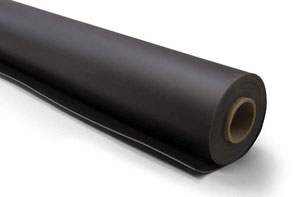
One of MLV's key advantages is its flexibility. MLV is just the ticket for use in awkward or tight spaces, as it can be bent and shaped around various surfaces, unlike rigid soundproofing materials. It is regularly installed in workplaces, homes, and vehicles to reduce unwanted noise.
By increasing the mass of a surface, mass loaded vinyl helps to decrease the amount of sound that is able to travel through. The higher the mass, the tougher it is for sound to pass through. Adding mass loaded vinyl to floors or walls allows for a considerable decrease in noise coming from outside or other rooms.
Overall, mass loaded vinyl proves to be an effective and versatile choice for soundproofing in Southsea. This material is offered in rolls and can be adjusted to size, making it simple for soundproofing specialists and DIYers to install. While mass loaded vinyl might have a slightly higher price tag than other materials, its outstanding performance makes it a worthwhile investment, especially in noisy settings.....READ MORE (Mass Loaded Vinyl Southsea)
Acoustic Glazing Southsea
For peace and tranquility indoors, consider acoustic glazing (also called soundproof glazing) - windows especially designed to block external noise pollution. It is particularly useful near noisy environments such as airports and railway stations, and in busy urban areas. Creating a quieter and more comfortable indoor space by limiting the amount of external noise that can enter a home or building in Southsea, is the main objective of this process.
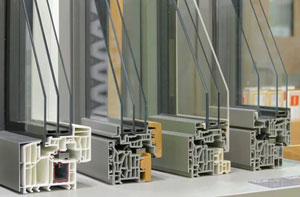
Using several layers of glass along with a special acoustic interlayer is typical for this sort of glazing. This special interlayer, usually a sound-absorbing plastic material, acts as a barrier to dampen incoming sound waves. The window can dramatically reduce noise transmission through the use of these layers, in contrast to standard double or single glazed windows. The thickness and the distance between the glass panes can also be adjusted to increase the noise-cancelling effect.
In addition to lowering noise, acoustic glazing has several other benefits. By improving thermal insulation, it can keep Southsea properties cooler during summer and warmer in winter. An advanced level of security is also provided, as the multiple glass panels make it far more difficult to break. In short, to improve living or working environments in Southsea, acoustic glazing provides a practical solution by fostering a quieter and calmer atmosphere. (Acoustic Glazing Southsea)
Soundproofing Curtains
If you've had enough of the never-ending noise from traffic, your noisy neighbours, or even the birds singing at daybreak, soundproof curtains could be just the solution you're looking for. These aren't your typical curtains; they come with extra-thick, dense fabrics that work to block sound and diminish echoes in the room. While they might not transform your home into a recording studio, they'll definitely make a noticeable improvement, resulting in a more tranquil and quiet space.
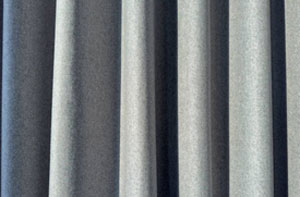
Soundproof curtains are truly a delight in terms of usability. There's no drilling involved, nor do you have to wrestle with complicated installations - simply hang them on your curtain pole, and you're off! A lot of styles also provide thermal insulation, allowing you to keep the heat in while shutting out noise, which is especially nice on cold nights in Southsea. And with so many styles and colours available, you can ensure your home looks fantastic without sacrificing your peace and quiet.
For bedrooms, home offices, or living rooms, soundproof curtains are ideal if you're trying to block out street noise while catching up on shows. They're an affordable way to handle everyday noise without costly renovations. So, if you're after some peace and quiet in your Southsea home, soundproof curtains are definitely worth a try. (30159 - Soundproof Curtains Southsea).
Local Soundproofing Enquiries

Recent soundproofing customer projects: Amanda Thomson and Thomas Thomson recently requested a quote for soundproofing the walls of a property in Portsmouth. Jessica Clarke from Drayton asked the question "is there somebody who does soundproofing near me?". Victoria Rose recently requested a quote for soundproofing a party wall in Cosham. Melissa Allen and Kevin Allen recently asked for a quote for improving the soundproofing on a wood floor in Eastney. Jennifer and Robert Adams recently enquired about getting a price for soundproofing a children's play room in Eastney. Tiffany Atkinson recently requested a quote for soundproofing a party wall in Hardway. William and Hannah Stewart recently asked for an estimate for reducing the levels of sound transmission in a cottage in Eastney. Sean and Rebecca Hunt recently asked for an estimate for reducing the levels of sound transmission in a cottage in Hardway. Anna Webb from Alverstoke asked "are there any experienced soundproofers in my area?". Emily White and Jacob White recently asked for a quote for improving the soundproofing on a wood floor in Portsmouth. Mr and Mrs Carter recently asked for a quotation for soundproofing a reading room in Farlington. Amber and Nathan Harrison recently asked for an estimate for soundproofing the ceilings of a cottage in Copnor. Alexander and Jessica Murray recently enquired about soundproofing a loft conversion in Hilsea.

Other Tradespeople in Southsea: Ok, so you're presently trying to find soundproofing in Southsea, however you might also require a scaffolder in Southsea, rubbish removal in Southsea, loft insulation in Southsea, home maintenance in Southsea, SKIP HIRE in Southsea, a carpenter in Southsea, partition walling in Southsea, a patio specialist in Southsea, a flooring installer in Southsea, a security expert in Southsea, a plasterer/renderer in Southsea, a bricklayer in Southsea, an odd job man in Southsea, during the course of any home improvement project in Southsea.
Soundproofing Near Southsea
Also find: Copnor soundproofing, Fratton soundproofing, Widley soundproofing, Farlington soundproofing, Bedhampton soundproofing, Eastney soundproofing, Buckland soundproofing, Gunwharf Quays soundproofing, Cosham soundproofing, Gosport soundproofing, Hilsea soundproofing, Alverstoke soundproofing, Portsea soundproofing, Hardway soundproofing, Wymering soundproofing, Portsmouth soundproofing, Drayton soundproofing and more. The majority of these towns and villages benefit from the presence of soundproofing companies who specialise in tackling noise-related issues. Possessing a wealth of know-how and expertise, these skilled professionals are adept at top-notch soundproofing for your property. By mitigating noise pollution effectively through custom solutions, these experts aim to create a more peaceful and quieter living environment for occupants. Local home and property owners can get soundproofing estimates by going here.
Southsea Soundproofing Tasks

There is a variety of work that can be conducted by your local Southsea soundproofing specialist including soundproofing surveys, concrete floor soundproofing in Southsea, soundproofing solutions, home soundproofing, soundproofing for ceilings, soundproof rooms, soundproofing windows, sound insulation testing, echo reducing, sound masking systems in Southsea, soundproofing supplies, domestic soundproofing services in, soundproofing rates in Southsea, residential soundproofing, underfloor soundplank installations, sound management in Southsea, soundproofing advice, acoustic panels, wood floor soundproofing in Southsea, soundproofing underlay, noise reduction, soundproofing walls from noisy neighbours, soundboard installation, noise measurement services, door soundproofing, acoustic noise cancelling services, resilient bar systems, office soundproofing, acoustic treatment in Southsea, acoustic mineral wool installation, and lots more. These are just a handful of the tasks that are performed by those installing soundproofing. Southsea professionals will be delighted to keep you abreast of their entire range of soundproofing services.
More: Noise Muffling, Soundproofing Solutions, Soundproofing Services, Noise Control, Soundproofers, Soundproofing Experts, Noise Muffling, Soundproofing, Soundproof Rooms, Noise Elimination, Soundproofing Specialists, Soundproofing, Noise Reduction Services, Soundproof Rooms, Noise Reduction Services, Noise Elimination, Noise Reduction, Soundproofing Firms, Soundproofing Services, Soundproofing, Noise Reduction Specialists, Sound Insulation, Sound Insulation, Cheap Soundproofing, Noise Muffling, Soundproofing Companies, Soundproofing Experts, Soundproofing Services, Noise Reduction Specialists, Noise Reduction.
Wall Soundproofing Southsea - Industrial Soundproofing Southsea - Cheap Soundproofing Southsea - Soundproofing Services Southsea - Home Soundproofing Southsea - Soundproofing Southsea - Acoustic Solutions Southsea - Floor Soundproofing Southsea - Soundproofer Southsea


